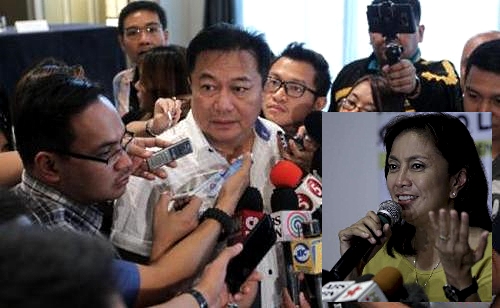MANILA, Philippines – Speaker Pantaleon Alvarez on Tuesday appeared to have softened his stance on the matter of impeaching Vice President Maria Leonor “Leni” Robredo over her video message to the United Nations criticizing the Duterte administration’s drug war.
In March, Alvarez had said he believed Robredo’s message before an international audience constituted betrayal of public trust, which is one of the grounds of impeachment under the 1987 Constitution.
He had said at that time he was studying the possibility of filing an impeachment complaint if he could find sufficient evidence to pursue a case.
In an interview Tuesday, however, Alvarez clarified: “Wala naman akong sinabi na talagang magpa-file ako. Di ba? Kaya ang sabi ko noon, pag-aaralan ko. Ngayon kung meron namang substance, bakit hindi (I didn’t say I was going to go ahead. That’s why I had said I was going to study it. Now, if there really is substance in it, and it can definitely stand in an impeachment trial, then why not?”
Two impeachment complaints against Robredo have been filed at the House, but no legislator has endorsed it yet to move the process forward.
Alvarez said the Volunteers Against Crime and Corruption (VACC) has asked him to endorse a separate impeachment complaint against Ombudsman Conchita Carpio-Morales, but he is still studying the documents.
Meanwhile, the impeachment complaint against President Rodrigo Duterte, filed by Magdalo Rep. Gary Alejano, has been referred to the justice committee for a hearing.
In a separate news conference, Albay Rep. Edcel Lagman said the complaint should be heard by the justice panel.
Section 3 (2) of Article XI of the Constitution on Accountability of Public Officers unequivocally provides: “The Committee, after hearing, and by a majority vote of all its Members, shall submit its report to the House within sixty working days from such referral, together with the corresponding resolution.”
“The hearing envisioned by the Constitution partakes of two phases: first, a preliminary hearing on the sufficiency of form and substance of the complaint; and second, a full blown hearing to determine the absence or existence of probable cause to impeach the respondent, after finding that the complaint is sufficient in form and substance,” he said.
“The allegations in the complaint must aver ultimate facts, not mere conclusions of fact and law, constituting the impeachable offense charged. The determination of sufficiency of form and substance is limited within the confines of the complaint and its annexes,” Lagman added.









